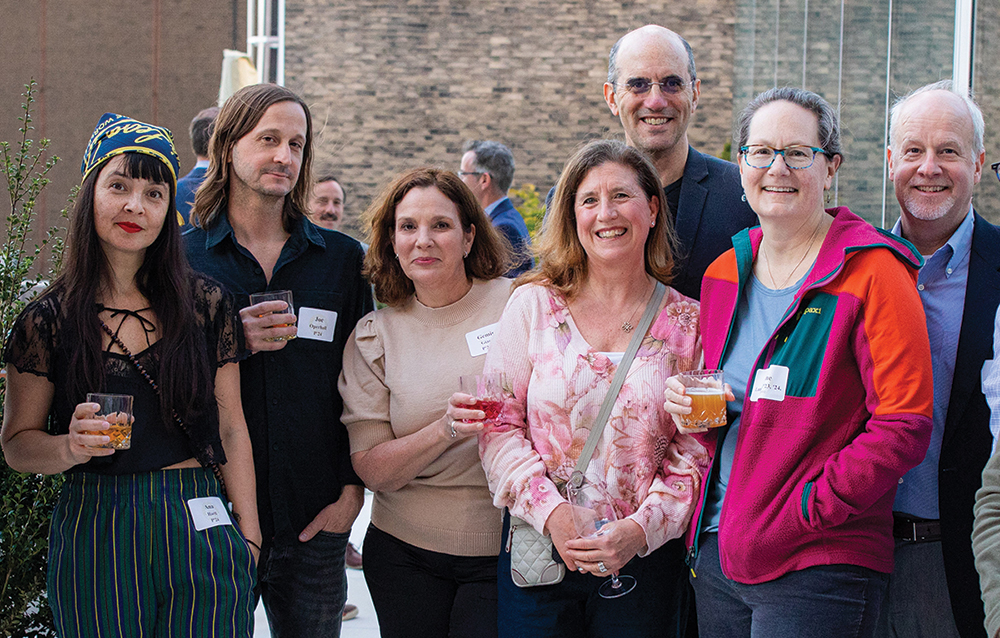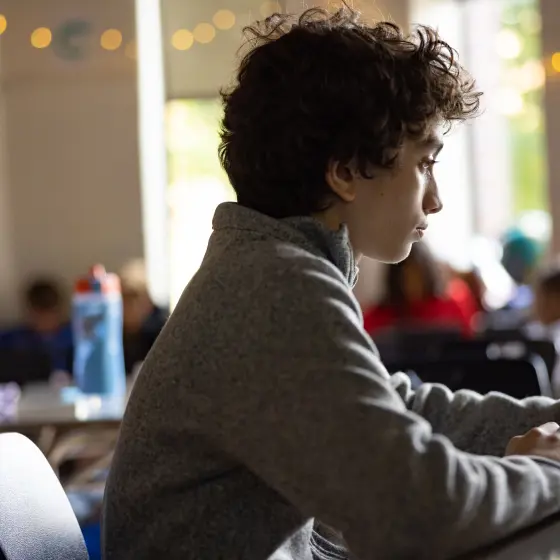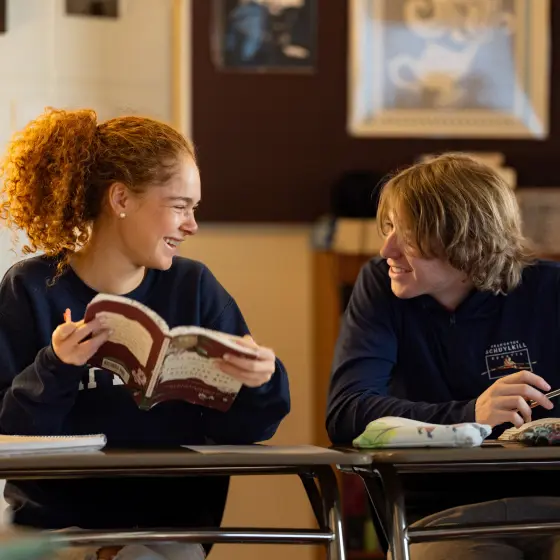Black History in the Philadelphia Landscape: A Q&A with Author Amy Cohen ’82
Amy Cohen’s first book, Black History in the Philadelphia Landscape: Deep Roots, Continuing Legacy, was recently published by Temple University Press.
|
Amy is a noted educator, historian, and writer who has served as the director of education for History Making Productions and is a contributing writer for Hidden City Philadelphia. She was Friends Select’s commencement speaker at graduation in 2023, and during Alumni Weekend this April, her work was included in WORD, an exhibition in the school’s Select Gallery highlighting alumni who are published authors. |
Amy Cohen’s first book, Black History in the Philadelphia Landscape: Deep Roots, Continuing Legacy, was recently published by Temple University Press.
Amy is a noted
educator, historian, and writer who has served as the director of education for History Making Productions and is a contributing writer for Hidden City Philadelphia. She was Friends Select’s commencement speaker at graduation in 2023, and during Alumni Weekend this April, her work was included in WORD, an exhibition in the school’s Select Gallery highlighting alumni who are published authors.
The following interview with Select News has been edited for length and clarity.
Can you tell us about your inspiration for writing Black History in the Philadelphia Landscape?
Amy Cohen: In 2005, I was a social studies teacher at Masterman Middle and High School, and the Philadelphia School Reform Commission unanimously passed a resolution mandating a year of African American history as a high school graduation requirement. I had been teaching a senior elective about Philadelphia history and knew a bit about the local Black experience, so I volunteered to teach the course.
Over the years of teaching the course, my understanding of local and American history was profoundly changed. I continued to deepen my knowledge of local Black history as Director of Education for History Making Productions, a documentary film company that focuses on Philadelphia history. I also became a monthly contributor to the online magazine Hidden City, and many of my articles relate to local Black history.
As an inveterate teacher, my goal has always been to share the remarkable stories I have learned. The motivation for the book was to put much of this learning into one place and through a consistent lens, that of the visible landscape.
How did you go about researching and documenting the deep roots of Black history
in Philadelphia? What resources did you find valuable?
AC: As with most history books, my research included a variety of primary and secondary sources. Historians Gary Nash, Erica Armstrong Dunbar, and Beverly Tomek have done excellent work on the Black experience in 18th- and 19th-century Philadelphia. Matthew Countryman’s Up South: Philadelphia During the Civil Rights and Black Power Era was extremely useful to me, both during my time teaching African American history and in writing this book. He is a Germantown Friends School graduate (as is Erica Armstrong Dunbar), so I think we share some of the same Quaker sensibilities.
I have read Dan Biddle and Murray Dubin’s Tasting Freedom: Octavius V. Catto and the Battle for Equality in Civil War America many times. I reread it to create a teacher’s guide, to write an abridged biography of Catto, and to produce a short film about Catto; I went back to it again in writing my book.
The most exciting part of research is using primary sources. We are so fortunate in Philadelphia to have places like the Historical Society of Pennsylvania, the Library Company of Philadelphia, the Philadelphia City Archives, and the Free Library of Philadelphia all in Center City and within easy walking distance of Friends Select. Temple University has two absolute treasure troves for people interested in the local Black experience. The Urban Archives at the Special Collections Research Center is an amazing place, and their Civil Rights in a Northern City website is an incredible resource. The Charles L. Blockson Afro-American Collection has a vast number of materials related to Black history. It is not an accident that the first chapter of my book is a tribute to the work of Charles Blockson.
As a historian and Philadelphian, how much of the book’s content were you familiar with before writing? Was there anything new or surprising that you encountered?
AC: I was familiar with most of the book’s content before writing because of my experience teaching the mandated African American history high school course and my choice to feature local history in my classes. I knew I wanted to dig deeper into the story of an effort in the late 1960s to rename Benjamin Franklin High School as Malcolm X High School. In doing my research, I learned that Malcolm X had spent a few months in Philadelphia, which I had not known.
In your research, did you come across any personal stories or narratives that deeply resonated with you or challenged common historical narratives?
AC: I think what most surprised me and continues to surprise others is the vibrance of the Free Black community in Philadelphia from the late 1790s to the Civil War period. Philadelphia was the center of Free Black life during those years, and despite racism and repression, Black Philadelphians forged a community that supported schools, churches, beneficial societies, literature circles, and so forth. The tenacity, hopefulness, dignity, and courage of those people—who never forgot that their brethren were enslaved in the South, and early on, even in Philadelphia—blows me away.
How did your experience at Friends Select inspire your interest in history, especially Philadelphia history?
AC: When I was in 11th grade, we did a project where we had to research our houses. This involved looking at city directories, maps, deeds, and census data. I remember visiting City Hall and the Historical Society of Pennsylvania and being amazed that I could see and touch these old materials to which I felt a direct connection. When I became a teacher, I always strove to create similar opportunities for my students. In my African American history class, the students had to write an in-depth research paper that required them to visit at least two special libraries or archives to find primary sources. I loved when my students would share their excitement as they, in some sense, recreated my FSS experience. Teaching at a school a few blocks north of FSS, I loved that my students, like me, could either walk or take SEPTA to such rich resources.
Are there any Friends Select connections to the historical sites in Philadelphia that highlight Black history?
AC: There are several landmarks and sites linked to the life and career of Reverend Leon Sullivan. His daughters, Hope and Julie, graduated from Friends Select in 1981 and 1979, respectively.
As an individual who sought to transform North Philadelphia, Sullivan’s impact is visible. A strip of North Broad Street with the honorary name Leon Sullivan Way is home to the current site of the Opportunities Industrialization Centers (OIC), founded by Sullivan, the Leon H. Sullivan Human Services Center, and Progress Plaza, now renamed Sullivan Progress Plaza, the nation’s first Black-owned shopping center, another initiative of Reverend Sullivan. A mural of Reverend Sullivan was painted across the street from Zion Baptist Church, the place for which he served as pastor for nearly four decades. Both Progress Plaza and Zion Baptist Church have historical markers that mention Sullivan, as does the original site of the OIC at 19th and Oxford Streets. The Sullivan family lived for a time at Greenbelt Knoll, an intentionally integrated housing development in Northeast Philadelphia; Sullivan is named in a historical marker there as well.
Perhaps the most significant tribute to be bestowed upon Sullivan took place in 2022 on the 100th anniversary of his birth: the international arrivals hall at Philadelphia International Airport was renamed in his honor. I attended the ceremony and was delighted to see Hope Sullivan there and to reconnect more than 40 years after leaving Friends Select.
As an author and historian, what do you hope readers take away from your book in terms of a better understanding of Philadelphia's Black history and its broader impact on American history?
AC: In terms of understanding American history, we in the North need to recognize that the stark sectional differences we have been told about are illusory; slavery was not just a Southern institution. Philadelphia was built, in part, by enslaved labor; Philadelphians (including Quakers) were involved in the slave trade and owned enslaved people; and, even after slavery ended in Pennsylvania, pro-slavery feeling in Philadelphia was widespread. Indeed, the abolitionist meeting place, Pennsylvania Hall, was burned to the ground by a pro-slavery mob just three days after it opened its doors.
I also hope that readers come away with an understanding of how long Black people have been a crucial part of the city’s development. Black people were on the shores of the Delaware River since before William Penn ever set foot here. There is a sense that the Black presence in the urban North began with the Great Migrations, but—especially in Philadelphia—the roots truly are deep, hence the subtitle of my book. Unfortunately, American textbooks have tended to tell the story of African Americans as something that began with slavery and ended with the Civil Rights Movement. The goal of the class I taught and of this book is to counter this simplistic narrative.
I further hope that readers gain a more specific understanding of how systemic racism has held Black people back for decades upon decades after the end of slavery. As recounted in my book, W.E.B. DuBois criticized Philadelphia employers for routinely refusing to hire even well-educated and highly educated Blacks; Sadie Alexander documented the ways in which Southern migrants were crowded into ever smaller and more expensive housing in the city just because of their race; and Cecil B. Moore led demonstrations because qualified Black laborers were denied construction jobs in their own neighborhoods. In Philadelphia, and in much of the country, many white people think it’s time for Black people to “get over” slavery. I hope my book underscores that the end of slavery did not mean the end of extreme race-based oppression.
What does your writing process look like when working on a book or an article? What have you carried with you in your writing process from your experience as a Friends Select student?
AC: My process is to do all the research first and then to shape what I’ve learned into a coherent, interesting narrative. For the book, I wrote the chapters in chronological order. I would be completely immersed in a topic for several weeks. Once I was satisfied with my work, I would send it to friends who acted as editors and to someone who was an expert on the given topic. I would revise the chapter accordingly and then move on and begin again.
At Friends Select, I also tended to do my research before setting pen to paper (literally, back in those days). I have also always preferred to get a rough draft on paper quickly and then go back and revise and polish.
What is your advice to Friends Select students who aspire to be a published author?
AC: That is a funny question to be asking someone whose first book will be published the same year she turns 60. For me, there were two keys to being able to get a book published. First, I had spent years building expertise in a topic that I was passionate about. Second, I wrote many articles which were well-received. This gave me the confidence to try something longer.
For those who may be interested in learning more about Black history in Philadelphia, what are some recommended next steps or resources they can explore after reading your book?
AC: The easy answer is that they should follow the “to-do” lists at the end of each chapter, which are meant to enrich and extend the content of the book. The book includes a map that shows the locations of the many sites described in the chapters.
The exciting thing about Black history is that so much was hidden for so long. With so much information being revealed as interest increases, I’d suggest following the work of groups like Friends of Tanner House and the Philadelphia 1838 Black Metropolis. There are also several Inquirer reporters who occasionally write about the uncovering of local Black history.
Where Next?





